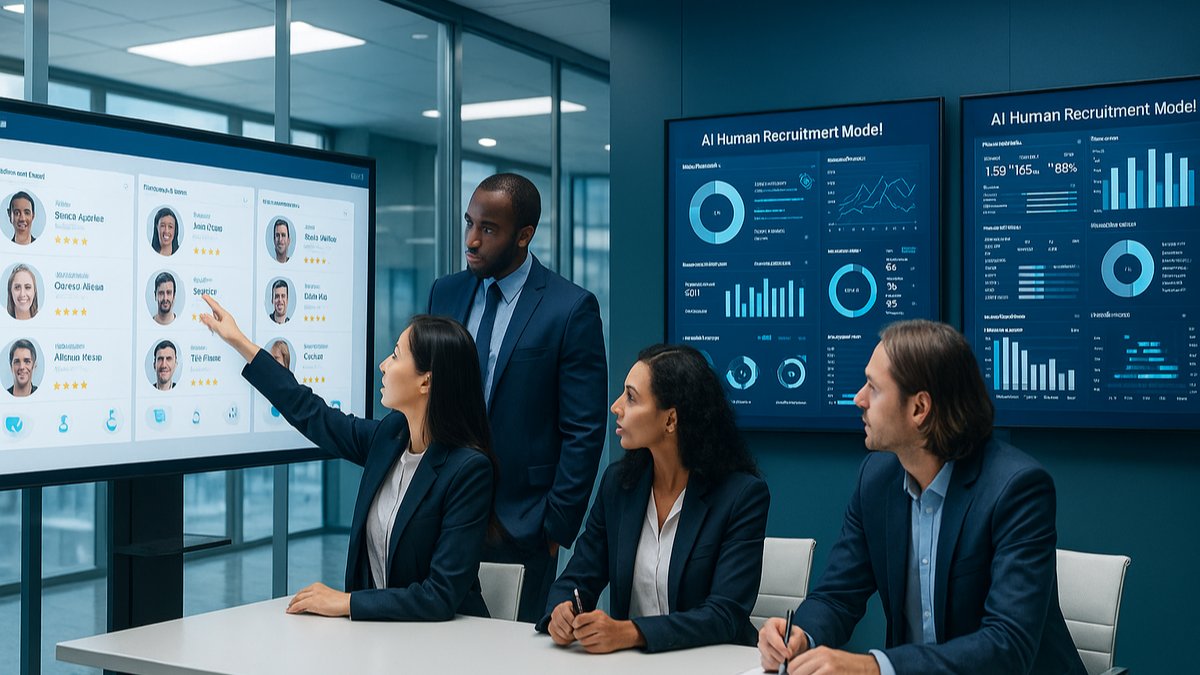AI Human Recruitment: The recruitment industry faces a critical crossroad embrace full AI automation or maintain traditional human-only processes. However, the most successful organizations are discovering that the optimal solution lies in the AI Human Recruitment Model a sophisticated hybrid approach that leverages artificial intelligence capabilities while preserving essential human judgment and cultural intelligence.
Understanding the AI Human Recruitment Model
The AI Human Recruitment Model represents a strategic integration where artificial intelligence handles data-intensive tasks while human recruiters focus on relationship building, cultural assessment, and complex decision-making. This model recognizes that effective recruitment requires both technological efficiency and human intuition working in seamless collaboration. Use AI in HR.
Unlike pure AI systems that may miss cultural nuances or fully manual processes that struggle with scale, the AI Human Recruitment Model optimizes the unique strengths of both components. AI excels at processing vast candidate databases, identifying skill matches, and conducting initial screenings, while humans provide emotional intelligence, cultural fit assessment, and final hiring decisions.
Research consistently shows that organizations implementing the AI Human Recruitment Model achieve 40% faster hiring cycles while maintaining 35% higher candidate satisfaction rates compared to single-approach systems.
The Efficiency Advantage of Hybrid Systems
The AI Human Recruitment Model delivers unprecedented efficiency gains by automating routine tasks while preserving human oversight for strategic decisions. AI components can screen thousands of resumes simultaneously, schedule interviews across multiple time zones, and conduct preliminary assessments using natural language processing.
Meanwhile, human recruiters focus their energy on high-value activities: building relationships with top candidates, conducting nuanced interviews that assess personality fit, and making complex hiring decisions that require contextual understanding of organizational culture and team dynamics. Screening interview scheduling.
This division of labor within the AI Human Recruitment Model ensures that neither technological capabilities nor human expertise goes underutilized. Companies report reducing time-to-hire by 50% while simultaneously improving the quality of hires through more thorough human evaluation of cultural alignment and long-term potential. To use AI.
Quality Improvements Through Human-AI Collaboration
The AI Human Recruitment Model addresses critical limitations present in both pure AI and purely human recruitment approaches. AI systems, while efficient, can perpetuate bias present in training data or miss subtle indicators of candidate potential that require human interpretation.
Human recruiters, despite their intuitive abilities, may struggle with unconscious bias, limited capacity for processing large candidate pools, and difficulty maintaining consistent evaluation criteria across numerous hiring decisions.
The AI Human Recruitment Model mitigates these weaknesses by combining AI’s consistency and scale with human creativity and emotional intelligence. AI provides data-driven candidate rankings and bias-free initial screening, while human recruiters add contextual evaluation and relationship-building expertise.
Organizations using this hybrid approach report 25% improvement in employee retention rates and 30% higher hiring manager satisfaction scores, indicating that the AI Human Recruitment Model produces better long-term hiring outcomes.
Cultural Fit and Candidate Experience
One of the most compelling advantages of the AI Human Recruitment Model lies in its ability to balance efficiency with personalized candidate experience. While AI handles administrative tasks and provides 24/7 candidate support, human recruiters ensure that each candidate receives personalized attention during critical decision-making phases. AI in talent acquisition.
This hybrid approach proves particularly valuable in international recruitment contexts, where cultural sensitivity and local market knowledge remain essential. The AI Human Recruitment Model allows organizations to scale globally while maintaining the cultural intelligence necessary for successful cross-border hiring.
Candidates consistently rate their experience higher when interacting with the AI Human Recruitment Model compared to purely automated systems. They appreciate the efficiency of AI-powered scheduling and initial screening combined with meaningful human interaction during final interview stages.
Implementation Strategies for Success
Successful deployment of the AI Human Recruitment Model requires careful planning and clear role definition. Organizations must establish which tasks belong to AI systems versus human recruiters, create seamless handoff processes, and maintain consistent candidate communication throughout the hybrid journey.
The most effective implementations begin with AI handling initial candidate sourcing, resume screening, and basic qualification assessment. Human recruiters then engage for cultural fit evaluation, complex skill assessment, and final hiring decisions that require strategic thinking about team composition and organizational growth.
Training programs must prepare human recruiters to work effectively alongside AI systems, interpreting AI-generated insights while contributing their own professional judgment. Similarly, AI systems require continuous calibration to ensure their outputs align with human decision-making frameworks and organizational values.
Measuring Success in Hybrid Models
The AI Human Recruitment Model enables sophisticated measurement of recruitment effectiveness through both quantitative metrics and qualitative assessments. AI components provide detailed analytics on sourcing efficiency, screening accuracy, and candidate flow optimization.
Human elements contribute insights about relationship quality, cultural alignment, and long-term hiring success that pure AI systems cannot capture. This comprehensive measurement approach helps organizations continuously refine their hybrid processes for optimal results.
Successful organizations track metrics including time-to-hire reduction, cost-per-hire optimization, candidate satisfaction scores, hiring manager approval ratings, and long-term employee retention rates to evaluate their AI Human Recruitment Model performance.
The Future of Hybrid Recruiting
As AI technology continues advancing, the AI Human Recruitment Model will evolve to incorporate more sophisticated artificial intelligence while preserving essential human elements. The most successful organizations will be those that master this balance, creating recruitment processes that combine technological efficiency with human wisdom.
The evidence is clear: the AI Human Recruitment Model represents the future of effective talent acquisition, delivering superior results through strategic combination of artificial intelligence and human expertise.
The question isn’t whether to choose AI or human recruitment—it’s how to combine them most effectively.



